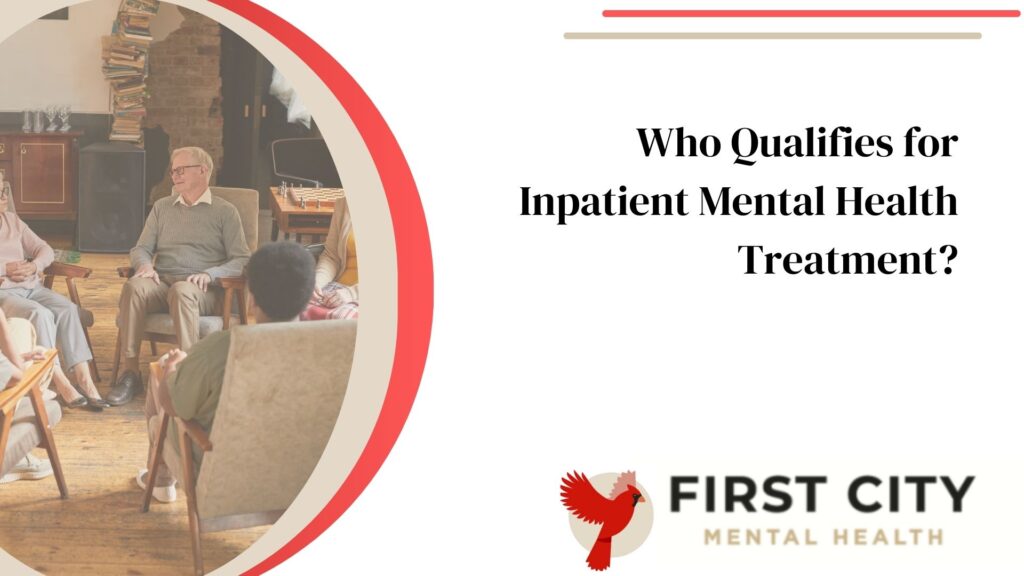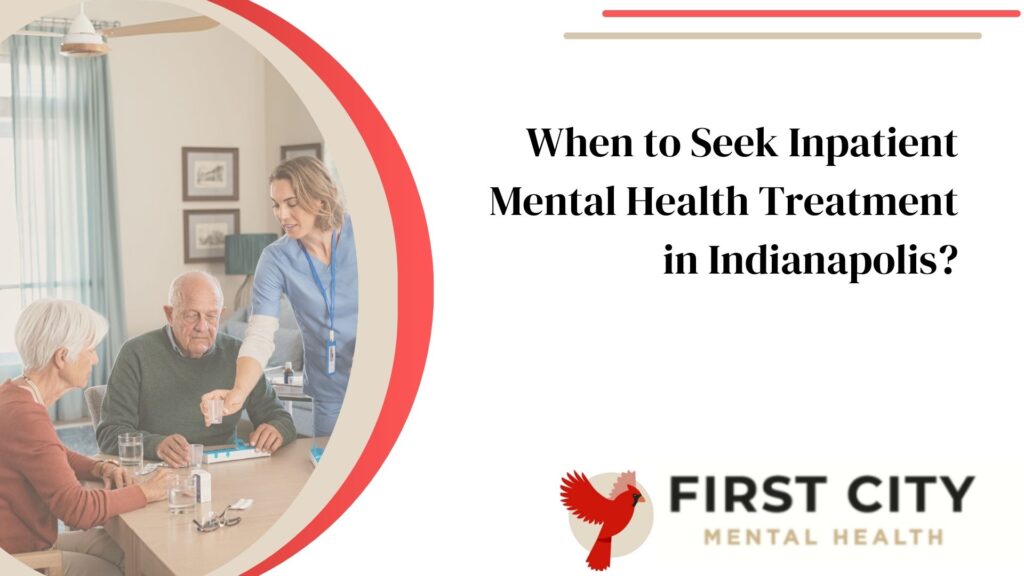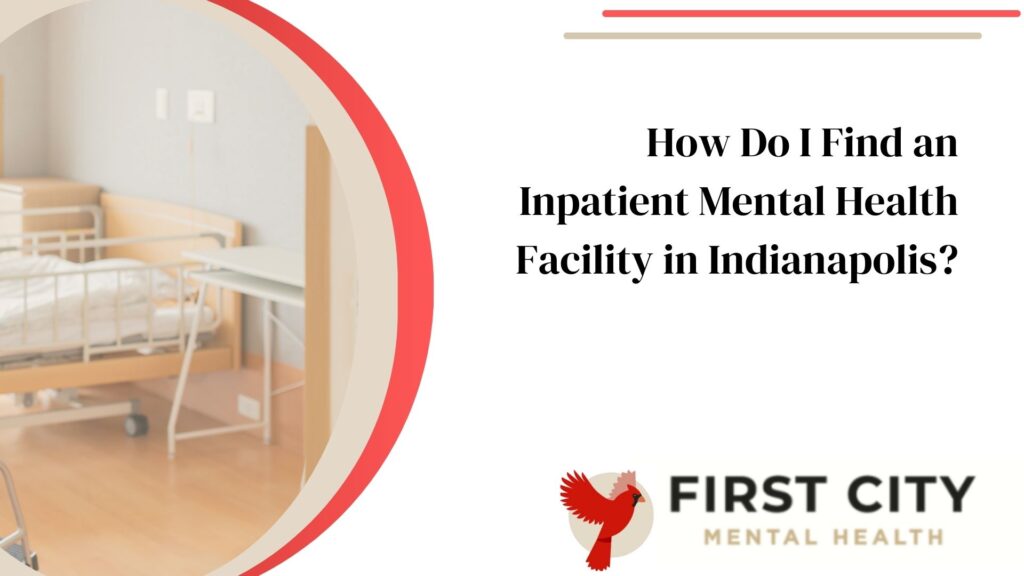
How Does Residential Mental Health Differ From Outpatient Services in Indianapolis?
January 15, 2025
How Long Do Inpatient Mental Health Programs Last in Indianapolis?
January 15, 2025Learn more with us about inpatient mental health facilities in Indianapolis. We will show you how to learn about the available care options. We’re focused on accessibility and trust for everyone who needs assistance.
In Indianapolis, facilities offer programs for all needs. Our mission is to make the information you need understandable. These centers provide supportive environments for healing. We try to walk you through what each facility offers. Understanding your options is essential to making the right choice. Let’s explore what Indianapolis has to offer for mental health care.
Key Takeaways
- Inpatient mental health facilities in Indianapolis offer intensive treatment and support for those experiencing severe mental health issues.
- People who require intensive monitoring or have not responded to outpatient treatment may be candidates for inpatient treatment. This includes people who pose a danger to themselves or others.
- To get in, you typically need a referral from a healthcare provider. Then, they’ll evaluate your mental health needs and check your insurance.
- Knowing when to seek inpatient treatment is critical. Signs include symptoms getting worse, not being able to function on a day-to-day basis, or having a mental health crisis.
What Is an Inpatient Mental Health Facility in Indianapolis?
Purpose and Services
inpatient mental health Indianapolis facilities offer a safe space for those who need intensive care. They assist people with serious mental illnesses such as depression, anxiety, or bipolar disorder.
We can find it in the form of therapy, medication, self-care, and activities that promote mental health. These places have trained professionals, like psychiatrists and therapists, who work closely with patients. Their goal is to help us stabilize and begin our path to recovery.
Certain facilities offer specialized programs that cater to different age groups. They also specialize in particular mental health conditions so that everyone can get the type of specialized help they need.
Facilities and Amenities
Indianapolis inpatient mental health facilities often include amenities to make our stay as comfortable as possible. We might see private or shared rooms, areas for recreation, and spaces for therapy sessions.
Some have fitness centers or art therapy rooms to help us relax and express ourselves. Meals provided are typically nutritious, catering to various diets. The environment promotes healing and security. It creates the best possible atmosphere for our recovery journey.
Duration of Stay
Length of stay differs based on our unique needs and progress. Some travelers may find that even a few days is enough of a stay. Others could benefit more from a longer visit. This flexibility ensures we get the care we need without undue pressure.
The staff is trained to review our treatment on a regular basis. They’ll update us on our progress — which helps us prepare for the transition home or to another level of care. It’s just a matter of finding the balance for each individual situation.
Who Qualifies for Inpatient Mental Health Treatment?

Individuals Experiencing Severe Symptoms
Indianapolis inpatient mental health only help some people with severe symptoms. They are frequently the first that come up when discussing who benefits from these services.
For example, people who have severe anxiety or depression that prevents them from functioning day-to-day may need inpatient care. In these settings, patients get 24/7 support, making it a safer place to stabilize.
This type of care is critical when outpatient treatments have not worked. The focused environment helps manage symptoms and teaches coping strategies.
Inpatient care can also help people with serious mood disorders or schizophrenia, where constant monitoring makes it safer to work through symptoms.
Individuals at Risk of Harm
Safety is another big one. Some might be a threat to themselves or others.
When someone is experiencing thoughts of self-harm or suicide, inpatient treatment allows for immediate intervention. Facilities provide a controlled environment in which they can be closely monitored. This type of care prevents harm and enables experts to function on crisis stabilization.
It’s not just about preventing harm; it’s also about understanding the underlying issues. By recognizing triggers and working through them with trained professionals, patients begin to be part of recovering in a secure environment.
Individuals Needing Detoxification
If you’re struggling with substance abuse, a supervised detox will often be necessary. Inpatient facilities in Indianapolis provide medical supervision to guide patients safely through withdrawal symptoms.
This is especially crucial when it comes to drugs like alcohol or opiates, which can have life-threatening withdrawal symptoms.
That structured setting allows patients to feel comfortable and supports them through the detox process. Medical staff can give you drugs to help curb symptoms and make it a little easier to get through.
Once detox is complete, patients can immerse themselves in therapy and counseling. These sessions are based on the underlying issues of addiction and promote continued recovery.
How Do I Get Admitted to an Inpatient Mental Health Facility in Indianapolis?
Understanding the Admission Process
We got to understand how the admission process works. In Indianapolis, that process usually begins with a mental health assessment with the best inpatient mental health facilities in Indiana. This evaluation may be conducted by a doctor or a mental health professional. They review our symptoms and decide whether inpatient care is appropriate.
In some cases, we may be referred by a general practitioner or a mental health counselor. It is very important that we give accurate and complete information in this assessment. That way we get the right care we need for our diagnosis.
Criteria for Admission
Next, we’ll investigate the criteria we must satisfy. Often, inpatient facilities prefer to accept those with serious mental health conditions (like major depression, schizophrenia, or bipolar disorder). They also take into account individuals who may be a risk to self or others.
Facilities determine if outpatient care isn’t adequate for us. This helps them determine whether inpatient care is required for stabilization and treatment. Keep in mind the criteria may vary slightly between facilities.
Choosing the Right Facility
When selecting a facility, we must consider multiple factors. Location is important — being close to home may help with the transition. Amenities and treatment options also come into play. Some have specialized programs, such as art therapy or substance abuse treatment.
Reviews and recommendations can help you get a feel for the facility’s reputation. If so, see if the facility accepts our insurance, which can vary. Being able to make an informed choice can make a huge difference in our ability to receive a quality care experience.
When to Seek Inpatient Mental Health Treatment in Indianapolis?

Identifying the Need for Inpatient Care
Knowing when to seek adolescent inpatient mental health facilities Indiana can be challenging. We sometimes start by assessing the severity of symptoms. When mental health symptoms are severe and unrelenting, they can take a substantial toll on everyday living. At this stage, inpatient care may be worth considering.
For instance, debilitating depression, persistent anxiety, or uncontrollable mood swings that won’t subside with outpatient treatment are telltale signs. This is why we must watch out for the signs, as early intervention can be key.
Safety Concerns and Crisis Situations
Safety is a major reason for inpatient care. If someone is a danger to themselves or others, immediate inpatient treatment may be needed. This includes things like suicidal thoughts or actions, self-harm, or violent behaviors.
We shouldn’t treat these situations lightly. Inpatient facilities offer a safe setting for individuals to receive round-the-clock supervision and support.
Lack of Progress with Outpatient Treatment
When outpatient treatment doesn’t work, it’s time to consider inpatient care. This includes situations where therapy, medications, or both have failed to produce significant gains. We may observe that despite treatment, the person continues to struggle to function on a daily basis.
In these scenarios, inpatient facilities provide intense, structured environments that can kickstart recovery.
What to Expect in Inpatient Mental Health Treatment in Indianapolis?
Admission Process
When we first connect with a facility, we speak with mental health facilities in Indianapolis. They are the ones who answer your questions and do a little pre-assessment. This determines whether we will have access to treatment.
In fact, this first call starts our journey together. It ensures that we get the right level of care right from the very beginning.
Treatment Approach
Once accepted, a team of professionals — psychiatrists, and psychologists — develop a customized treatment plan for us.
This plan often incorporates various types of therapy. We may have medication management, individual therapy, group therapy, and family therapy.
These therapies seek to address our problems from several different angles. It really hones in on rest and relaxation and, of course, stress reduction, which is vital in our recovery.
Staff Expertise and Environment
Having spent 12 years in medicine and 9 in behavioral health, the staff are prepared to assist us.
They’re committed to maintaining a safe and supportive environment. It allows us to achieve our goals and thrive.
Their strong educational backgrounds mean they communicate effectively, helping us feel understood and supported.
How Do I Know if I Need Inpatient or Outpatient Mental Health Care in Indianapolis?
Understanding Your Needs
First, we should determine whether inpatient or outpatient care is right for us. Knowing our specific needs will help us make a better decision for inpatient mental health treatment.
Consider just how stark our symptoms are. If someone is experiencing severe depression or anxiety that makes everyday activities impossible, inpatient care can provide critical assistance. Further, if safety is an issue, getting inpatient treatment might be the best choice. This type of care offers a space that’s safe, with support 24/7 from experts who understand what you’re experiencing.
However, if we can handle our symptoms with some support, outpatient care may be the best fit for us. We don’t need to be constantly supervised, so we have more of our freedom. This allows us to maintain our usual routines while also accessing the support we require.
Assessing Available Support Systems
Another thing to get into is our support system. Do we have friends or family that can help us out how we need it?
If we do, outpatient care could work because we can rely on these people to provide additional support. Without a strong support system, we can feel alone. Inpatient care provides the community we need during hard times. A break from the daily grind is often essential, too. It gives us the chance to get better without the noise.
Evaluating Personal Circumstances
If we take a look at our personal situation, does work or family obligations prevent you from attending outpatient treatment on a regular basis? Are there specific challenges in your life that get in the way?
Inpatient care can offer a more structured approach, allowing us to focus solely on our health. If our schedule allows it, we can also consider outpatient care. It’s flexible, and we can have our treatment and still live comfortably.
What Questions Should I Ask Before Enrolling in an Inpatient Mental Health Facility?
What are the treatment programs available?
We might start by asking how many treatment programs there are in inpatient mental health facilities.
Additional facilities may provide various types of therapy, such as cognitive-behavioral therapy, group therapy, or medication management. For example, some facilities emphasize holistic approaches like art therapy or yoga. The first step is to know what options are available so we can choose a facility that works for us.
How qualified is the staff?
It’s important that you check up on who the staff are and what their credentials are. We have to inquire about the credentials of psychiatrists, therapists, and support staff. Are they licensed to do so? Do they have experience with our particular mental health condition? Facilities that have highly trained professionals are able to provide safer, more effective care.
What is the typical daily schedule?
Knowing what a day in the life looks like allows us to know what to anticipate. We need to ask about the mix of structure and freedom. For example, is there time for personal reflection or leisure activities? A clear schedule can help you anticipate what the routine and structure of the facility will be like.
How does the facility handle emergencies?
It’s important to understand how emergencies are handled. Ask about procedures for medical or mental health crises.
Is there a nurse or doctor available around the clock? How does the facility communicate with family members during emergencies? Knowing these details ensures we’re in a safe environment.
What are the costs and payment options?
Finally, you have to know what it is going to cost and what the payment options can be. We have to ask, do you take insurance? Are there any payment plans? Are there any additional fees for specific treatments? Transparent information on costs allows us to budget for the stay.
How Do I Find an Inpatient Mental Health Facility in Indianapolis?

Research Options Available
If we’re searching for inpatient mental health facilities in Indianapolis, there are a few ways we can begin.
One easy way is to search online. Websites such as Psychology Today and Mental Health America provide directories of facilities. They have filters, so we can drill down by location and specialties.
Take a close look at the services each facility provides. Some may specialize in certain conditions, such as depression or anxiety, while others may take a more expansive approach.
Conclusion
It takes time and effort to find the best inpatient mental health facilities in Indiana. We require clean information and sound sources to make wise decisions. We’ve covered what inpatient care is, who it helps, and how to get in.
It’s crucial to know when to seek help and what to expect from treatment. The difference is asking the right questions before enrolling. You want a place that suits your needs and has a proven track record.
Don’t be afraid to ask questions and obtain all the information you require. Act now and go get the support you deserve.
Frequently Asked Questions
What services do inpatient mental health facilities in Indianapolis provide?
Inpatient mental health facilities provide around-the-clock care. Services include psychiatric evaluations, medication management, therapy, and crisis intervention. They offer a more structured setting for people who require intensive support.
How long is the typical stay in an inpatient mental health facility?
Stays last anywhere from a few days to a few weeks on average. Duration depends on the individual and their treatment plan. The first thing is getting stabilized and getting treated.
Are family visits allowed during inpatient treatment?
Yes, most facilities welcome family participation. Visits are prearranged and monitored. Family involvement may be critical for support and recovery.
Can insurance cover inpatient mental health treatment in Indianapolis?
Most insurance plans cover inpatient treatment. Coverage varies, so you need to check with the insurance provider. Facilities also tend to help resolve insurance questions and handle paperwork.






